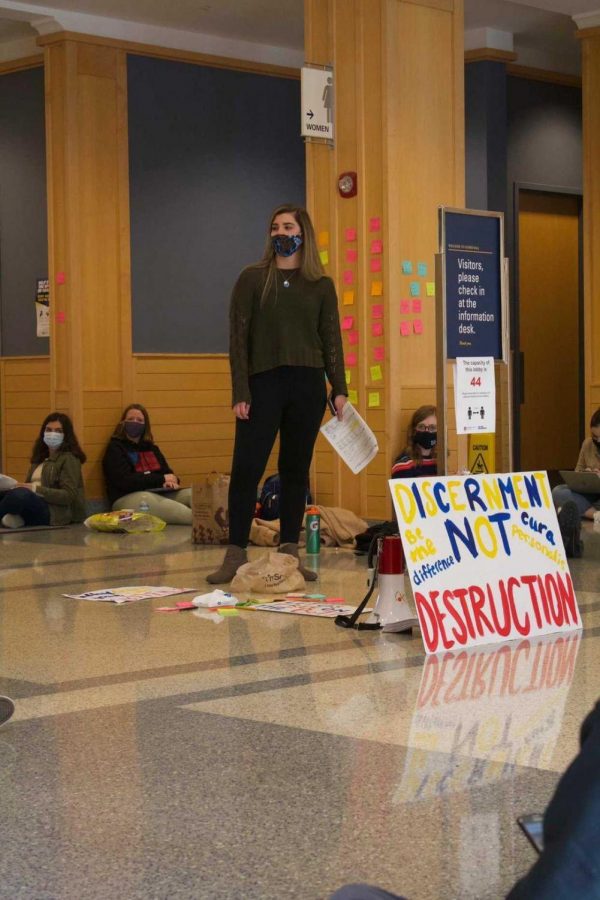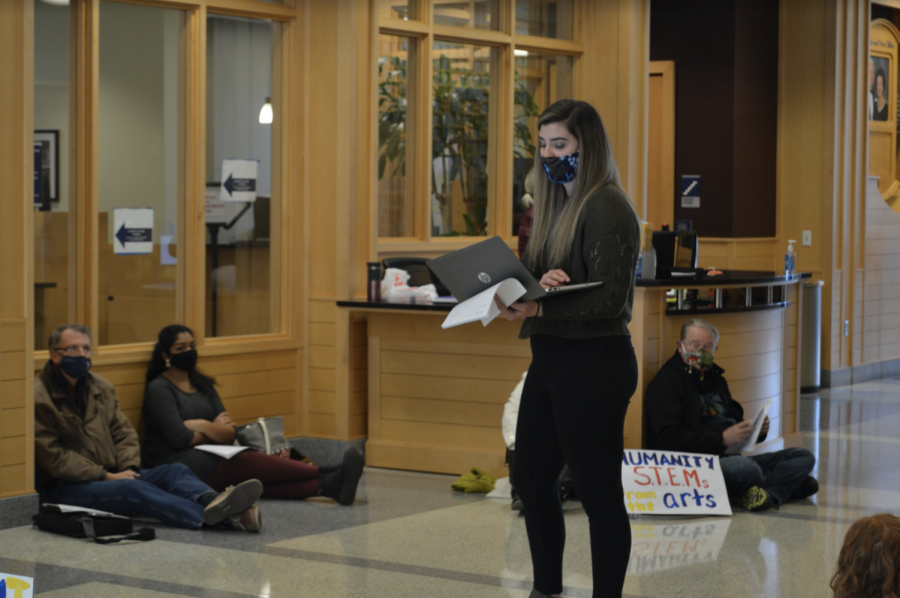Marquette has been faced with a series of severe budget cuts, which have led to the layoffs of 39 staff members on Jan. 22. Women from different groups within Marquette’s campus have spoken up and voiced their concerns of Marquette’s senior leadership handling of the firings.
Sameena Mulla, vice president of the American Association of University Professors at Marquette, said she has done several things in attempts to better Marquette.
“I have been at Marquette for 12 years and have been on the committee of diversity and equity which is a standing committee of the academic senate,” Mulla said. “I’ve written a lot of policies and looked at a lot of data with my colleagues on that committee about the realties of what’s happening on this campus.”
Last semester, as a result of potential faculty layoffs a group of students staged a sit-in inside Zilber Hall. Of the protester, Brooke McArdle, a recent Marquette graduate, was the only student given two student conduct violations for attending a protest in regards to Marquette’s pending budget cuts.
“It was very clear that I had been singled out to be a target of the administration and to be made an example of to keep students silent. They were very clear that this was a time to force submission from their students, particularly I believe female students.”
Mulla and other faculty were worried about what the university’s handling of the situation would communicate to other Marquette students.
“We had some concerns that targeting Brooke was also going to send a chilling message to other students who are active on campus,” Mulla said. “I admire her conviction and her willingness to advocate for what she saw as the right thing to do.”
In addition to Mulla’s disapproval over how the administration handled the sit in, she also believes that Marquette faculty are often left out of detrimental decisions made by Marquette’s administration.
“Over the years there have been things that caused concern like the Intellectual Property Policy. Initially faculty were really left out of the loop on that, so there does seem to be a pattern where faculty are not brought in early enough decision making processes,” Mulla said.
Additionally, Mulla explained how she got her voice to stand up for non-tenure faculty.
“My interest in diversity and equity framed my approach to thinking about how to advocate for the faculty voice to be stronger in this budgeting process,” Mulla said.
Kristen Foster, director of Disciplinary Honors in the Humanities Program and member of the AAUP, had a difficult time to adjusting to Marquette when she was hired about 20 years ago.
“My Marquette story began when I was hired in 2002–a new professor with a young child,” Foster said in an email. “I remember clearly trying to juggle a commute, the teaching that I loved, service responsibilities, and research all while raising a child with my husband.”
Foster expressed her concern for Marquette’s future curriculum.
“I became involved in the Disciplinary Honors in the Humanities Program because I have been deeply concerned about the devaluing of the Humanities both at Marquette and nationally,” Foster said in an email. “Dropping Languages and History from the Core Curriculum is just one sign of this change.”
The students at Marquette have been part of the reason as to why Foster is speaking up to Marquette’s administration.
“I am learning how to advocate for the humanities and the students who love them as I do,” Foster said in an email. “I have seen how deeply the faculty here at Marquette care about this place and our students as we have engaged in difficult conversations when we disagree with our upper administration.”
Foster said that there must be a change within Marquette.
“Marquette has room for improvement as it moves further into the 21st century, but it has a venerable foundation upon which it can change,” Foster said in an email.
Julia Paulk, member of executive leadership board in the AAUP, said how she first heard of the budget cuts.
“At the end of summer, we received an email from the president saying that there were likely to be cuts at the university without much further elaboration,” Paulk said. “A few weeks into the fall semester, there was an announcement made that 200 people were going to be fired from the university.”
Paulk said why she felt compelled to speak up to the Marquette administration.
“I felt that it was important to ask questions and get answers because there are a lot of faculty that have questions about the budget and decisions being made,” Paulk said.
Paulk said particular departments are at stake with the recent budget cuts.
“I’m in the department of languages, literatures, and cultures and it became clear through with conversations with our Dean that our department was at risk. Language study is central to a Jesuit education and it’s hugely beneficial to students today to have a language skills,” Paulk said.
Paulk shared how she spoke up and shared her opinion in regards to the budget cuts.
“I have attended as many of the meetings as I can. Meetings with the provost, coffee chats, the Dean has had regular coffee meetings, I have tried to attend senate meetings, and have tried to make my voice heard through those meetings,” Paulk said.
Many of Marquette’s female students and faculty have made an effort to speak out about issues on campus. McArdle explained how difficult it is to advocate as a female on Marquette’s campus.
“I think one of my big takeaways from being a female organizer on campus is that we have to do a lot more to prove that we deserve a seat at the table when talking about concerns with the university.”
Correction: A previous version of this story incorrectly stated that “39 non-tenured faculty were laid off Jan. 21.” In a letter from President Lovell in the Jan. 22 Marquette Today, it stated “39 of our staff colleagues have been notified this week that their positions with Marquette have been eliminated.” The letter went onto address that the actions taken “do not involve any tenured or tenure-track faculty losing their positions.” Though no mention of non-tenure track faculty positions within the letter, the Office of Marketing and Communication later clarified that the layoffs only affected staff members and not non-tenured track faculty.
The story has been updated to correctly state that “39 staff members were laid off Jan. 22.” The Wire regrets this error.
Megan Woolard contributed to this report.
This story was written by Natalija Milesunic. She can be reached at natalija.milesunic@marquette.edu










